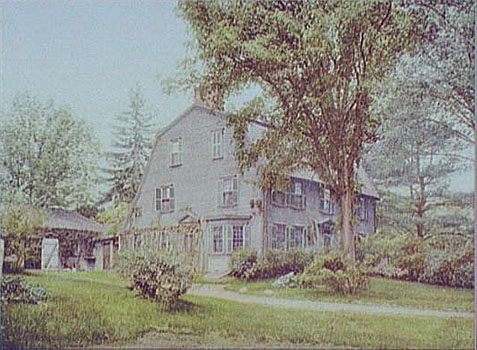
(Library of Congress, Prints and Photographs Division, Detroit Publishing Company Collection.)
Emerson Ralph Waldo (1803-1882)
The great predecessor in the art of lecturing. The 'American Scholar' is often referred to by John Cowper, though flittingly. Emerson after all had also been in great demand as a lecturer on Lyceum platforms in New England as his Journal testifies. For instance in Beloit, Wisconsin, January 9, 1856, he wrote:Mercury varying from 20° to 30° below zero for the last week...This climate and people are a new test for the wares of a man of letters. All his thin, watery matter freezes; 'tis only the smallest portion of alcohol that remains good.and according to his contemporaries, his hearers 'walked homeward with prouder stride over the creaking snow.'
John Cowper's list in his One Hundred Best Books includes Emerson's Complete Works for, he saysThe clear, chaste, remote and distinguished wisdom of Emerson with its shrewd preacher's wit and country-bred humour, will always be of stirring and tonic value to certain kindred minds.and in 1903, he advised his younger brother Llewelyn, who was then 19, to direct his attention to Emerson and his Essays:There you will find a sturdy optimist who will give you meat in due season — and bring with him some fine purgatives to clear the bowels afterwards. (Letters to His Brother Llewelyn)
The resemblances between Emerson and Powys are striking especially as concerns their relation to the cosmos and the elements. For instance in his Journal Emerson notes:The stars are the apexes of what wonderful triangles! What distant and different beings in the various mansions of the universe are contemplating the same one at the same moment.
And also:Water, air, light, carbon, lime, and granite...and I have died out of the human world and come to feel a strange, cold, aqueous, terraqueous, aerial, ethereal sympathy and existence — I sow the sun and moon for seeds. (Journals and Miscellaneous Notebooks, 11 of May 1838.)
One must also remember that Emerson, long before John Cowper, had the greatest admiration for Walt Whitman, whose Leaves of Grass Emerson praised in his — famous — 1855 Letter.
|
|